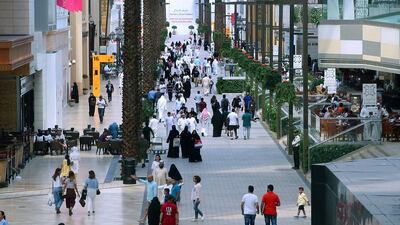Abu Dhabi // Populist rhetoric has long been prevalent in Kuwait’s parliament, but public frustration over economic reforms and the return of an empowered opposition to the Gulf’s most independent legislature have set the stage for increasingly strident politics targeting expat residents.
The opposition is a mixed bag ranging from Muslim Brotherhood Islamists to ultraconservative Salafis to nationalists, leftists and liberals, with a smattering of young first-time members. But they all appear to agree that public services are deteriorating and it is the fault of expats who are a drain on the state’s resources. Rather than economic reform such as subsidy cuts, the country needs to get rid of them – or at least reduce their numbers and give their jobs to Kuwaitis.
And since the elections in November, the opposition occupy nearly half of the 50 seats in the National Assembly, while most of the pro-government incumbents were voted out.
The election took place six months ahead of schedule because the emir, Sheikh Sabah Al Ahmad Al Sabah, dissolved parliament in the face of staunch opposition to unpopular cuts in subsidies for fuel and electricity following a drastic fall in oil prices over the past two years. Kuwait’s ruler or its constitutional court have now dissolved the assembly nine times since 1976.
Having boycotted the previous two elections since 2012, this time the opposition read the public mood and participated, campaigning largely on pledges to resist cuts to the cradle-to-grave benefits that Kuwaitis have enjoyed for decades. A key component in the 70 per cent voter turnout were the middle class, from less powerful tribes who are more reliant on government jobs, subsidies, cheap loans, free education and housing.
“All those young Kuwaitis waiting to be hired in the public sector should immediately take over the jobs of expats,” said one opposition candidate, Ali Al Khamis, during the election campaign.
“This is where a lot of the sentiment of ‘don’t give our jobs away to expats’ is coming from,” said Courtney Freer, a researcher at the London School of Economics Kuwait Programme. “There is a lot of derogatory language because expats are sometimes seen as a drain on increasingly limited state resources, rather than as aiding state development.”
Opposition members want the labour law to be amended, raising the minimum wage for expats, and also taxing them on the remittances they send home, all to discourage the hiring of foreigners for all but the most highly-skilled jobs.
One Salafi MP went so far as to call expats “settlers”.
Among the more imaginative suggestions is to tax expats 100 fils for walking on roads and pavements, as part of a broader plan to make taxation so onerous that foreigners would stop coming to work in Kuwait – an idea proposed by Safa Al Hashem, the only woman MP and a liberal. She believes the country has reached “danger level” with its population ratio, and that Kuwait no longer needs foreigners, most of whom should be deported.
“Kuwait is unique in the Gulf as the parliament can serve as a real vehicle for populist politics, where citizens can defend their entitlements,” said Kristin Diwan Smith, an expert on Kuwaiti politics and economy at the Arab Gulf States Institute in Washington. “This means necessary increases in fees and cuts in subsidies get thrown on to the backs of non-citizens. Failures in government, especially the inability to expand public services for a growing population, escalate the competition over resources.”
Kuwait’s budget deficit for 2015-2016 – the first in its history – was US$15billion (Dh55bn), and a deficit of as much as $40bn is projected for this year, according to a recent report by the US Congressional Research Service. With oil prices not expected to reach Kuwait’s break-even price of $75 per barrel, there is no sustainable way to avoid reductions in public sector salaries and subsidies.
The previous, pro-government parliament also sought to blame migrant workers for unemployment, overburdened public services and fraying infrastructure. Non-citizens have already seen an increase in costs for mandatory health insurance and will have to use separate medical facilities. The government plans to reduce the proportion of expats from 70 per cent of the 4.4 million population to 60 per cent by 2030, although opposition MPs have demanded this be achieved much sooner, even as quickly as three years. The government also plans to impose new taxes expats and increase fees for services.
Parliament was to hold a special session this month to discuss reducing the expat population, but fell short of a quorum by two members. Some observers say that on issues such as subsidy reform, the opposition could muster a simple majority.
Despite the new parliament’s mandate, the observers saw little to suggest that its confrontation with the cabinet over austerity measures would lead to a different outcome than with previous parliaments, which were dissolved by the emir once tensions reached unacceptable levels, or on legal grounds by the constitutional court.
In the current context, though, the next parliament is unlikely to take a softer position on these questions.
Kuwait’s assembly reflects the citizenry to a greater degree than in other GCC countries, and provides a unique window into the dynamics within Gulf societies as they wrestle, to varying degrees, with the challenge of how to reconcile deep changes to the economy wrought by low oil prices without upending the existing political order.
“Nationals’ frustration with expats is something we don’t hear much about in the Gulf simply because there’s not much of an outlet for it other than Twitter,” Ms Freer added. “Because Kuwait has an institutionalised place for these arguments to be made, we’re understanding a bit more of what’s going on.”
tkhan@thenational.ae

